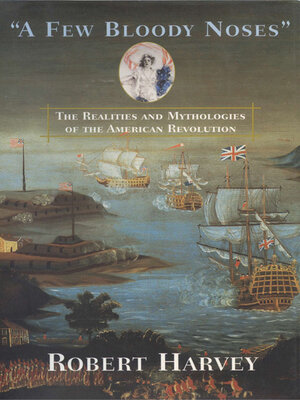"A Few Bloody Noses"
ebook ∣ The Realities and Mythologies of the American Revolution
By Robert Harvey

Sign up to save your library
With an OverDrive account, you can save your favorite libraries for at-a-glance information about availability. Find out more about OverDrive accounts.
Find this title in Libby, the library reading app by OverDrive.



Search for a digital library with this title
Title found at these libraries:
| Library Name | Distance |
|---|---|
| Loading... |
The noted British historian and author of Liberators offers a colorful, enlightening and myth-busting history of the American Revolution.
According to King George III, Britain merely wanted to give America "a few bloody noses" and return to mutual cooperation. Yet the ensuing uprising led to the creation of the United States, the most powerful country in the modern world. In "A Few Bloody Noses", Robert Harvey challenges conventional views of the American Revolution in almost every aspect—why it happened; who was winning and when; the characters of the principal protagonists; and the role of Native Americans and enslaved people.
Harvey takes a penetrating look at a war that was both vicious and confused, bloody and protracted, and marred on both sides by incompetence and bad faith. He underscores the effect of the Revolution on the settlers in America, and those at home in Britain—the country that the settlers had left behind, and to which many returned. The result is an extraordinarily fascinating and thoroughly readable account.
According to King George III, Britain merely wanted to give America "a few bloody noses" and return to mutual cooperation. Yet the ensuing uprising led to the creation of the United States, the most powerful country in the modern world. In "A Few Bloody Noses", Robert Harvey challenges conventional views of the American Revolution in almost every aspect—why it happened; who was winning and when; the characters of the principal protagonists; and the role of Native Americans and enslaved people.
Harvey takes a penetrating look at a war that was both vicious and confused, bloody and protracted, and marred on both sides by incompetence and bad faith. He underscores the effect of the Revolution on the settlers in America, and those at home in Britain—the country that the settlers had left behind, and to which many returned. The result is an extraordinarily fascinating and thoroughly readable account.







